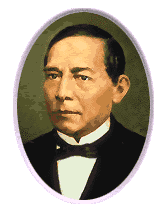Teachers union in Mexican politics
In an article I found frustratingly deficient in political information, the Washington Post reports on a traditional protest that, like Mexican politics, seems to be in the process of change.We might note that Oaxaca, the southernmost Mexican state, was the home of Benito Juarez [at right] and Porfirio Diaz. [below at left]
 We might also ask why the teachers union, a mainstay of the PRI structure, is "credited with mobilizing the huge turnout of voters that may have given Felipe Calderon his narrow margin of victory..." It is a state that has elected a PRI governor (apparently fighting with the teachers union), 11 (out of 11) PRI Federal Deputies and 2 (out of 3) PRI Federal Senators. And I'd like to know who credits the union with that achievement. Is it a good example of the power of the unions (the teachers union specifically)? I'd also like more information about "...the remarkable reach and influence of unions in Mexico..." and the assertion that "None is more powerful than the teachers union.." I guess I'll have to read some more informative sources and set students to researching the background to those assertions.
We might also ask why the teachers union, a mainstay of the PRI structure, is "credited with mobilizing the huge turnout of voters that may have given Felipe Calderon his narrow margin of victory..." It is a state that has elected a PRI governor (apparently fighting with the teachers union), 11 (out of 11) PRI Federal Deputies and 2 (out of 3) PRI Federal Senators. And I'd like to know who credits the union with that achievement. Is it a good example of the power of the unions (the teachers union specifically)? I'd also like more information about "...the remarkable reach and influence of unions in Mexico..." and the assertion that "None is more powerful than the teachers union.." I guess I'll have to read some more informative sources and set students to researching the background to those assertions.
In Mexico's 'Misery Belt,' an Annual Strike Becomes Much More
"OAXACA DE JUAREZ, Mexico -- Gonzalo Toledo Cruz tries to teach math in a dark, sweltering classroom that has no electricity... Toledo Cruz's classroom in Juchitan de Zaragoza, a small, rugged town in what is known as "the Misery Belt" east of Oaxaca de Juarez, has become his private hell. But he knows that to curry favor with his bosses and get the transfer he so desperately wants, he must make a big show of union support.
"So each May, Toledo Cruz joins nearly 70,000 teachers, administrators, school doctors, food-service workers and janitors in this picturesque colonial city. Their gathering -- now in its 26th year -- has become one of Mexico's longest-running serial protests and a forum for complaints about low wages, poorly equipped schools and unfair treatment of indigenous peoples.
"Most years, the school workers peacefully chant and march for a week or two, win some minor concessions and pack up. But this year, the protest has turned into a tense, occasionally bloody standoff that has scared off tourists and is now stretching into its third month, with no end in sight.
"The stalemate illustrates the remarkable reach and influence of unions in Mexico, where workers' organizations play a huge role in defining the political and social lives of their members. None is more powerful than the teachers union, which has 1.3 million members nationwide and is the largest union in Latin America.
"The teachers union is credited with mobilizing the huge turnout of voters that may have given Felipe Calderón his narrow margin of victory in the disputed July 2 presidential election. A small piece of that union, the chapter in southern Mexico's Oaxaca state, has shown its clout by effectively bringing gridlock to this region's political world with a forceful call for the ouster of state Gov. Ulises Ruiz Ortiz, whom union members blame for failing to secure more federal funding for the schools...
"The city's residents usually tolerate the protests, comforted by an unspoken contract that teachers will have their say, then leave. Visitors still pour into the city, famed for its ruins and the rich black mole its chefs concoct from simmering chocolate and chilies.
"But this year, as the tourism that Oaxaca de Juarez lives on has waned, downtown business owners and workers have grown more agitated. They are particularly peeved that the protest forced the cancellation of Oaxaca's popular Guelaguetza cultural festival...
"The teachers have said that they are simply standing up for their rights against a system with a legacy of corruption. The state and federal government have a history of spying on teachers, jailing them without cause and possibly playing a role in the deaths or disappearances of 150 teachers since 1970, human rights groups say. The teachers union isn't without its own record of corruption and cronyism. School workers sometimes make payoffs to secure cushy lifetime jobs here in Mexico's second-poorest state..."



0 Comments:
Post a Comment
<< Home